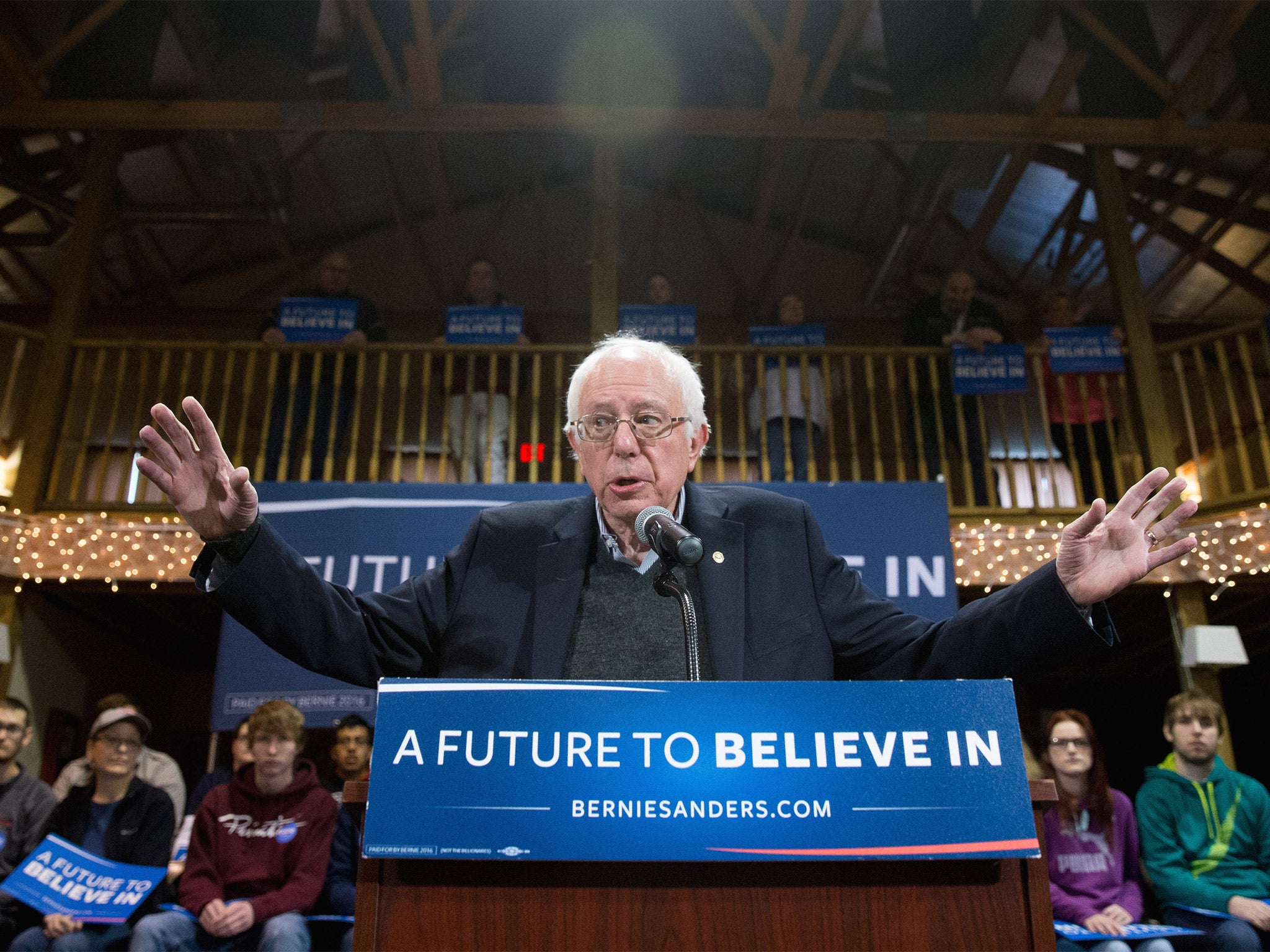US Democratic nomination: Bernie Sanders tells Iowa 'I don’t represent billionaires'
The former outsider for the Democratic presidential nomination is now level in polls with Hillary Clinton

Standing at a podium in an open-rafter barn on the grounds of a Wild West museum in Fort Dodge, Iowa, Bernie Sanders admitted his bid to be the Democratic nominee for president appeared humble. “This is the campaign, nothing fancy, no ‘PowerPoints’, no marching band, this is it,” he said.
The success of his brand of humility looked improbable when he launched it last summer. Yet it is one that has gained sudden and accelerating traction in spite of that simplicity and, above all, perhaps, in spite of his touting a message not just of radical reform for the country and its political system but also of socialist reform.
A CNN poll just released for New Hampshire puts the Senator for Vermont on 60 per cent, with his main rival Hillary Clinton on 33 per cent.
Drawing 3 per cent support when he first started, Mr Sanders, who calls himself a democratic socialist, is now neck and neck with Ms Clinton, once the front-runner for the party’s nod, in Iowa, the state which will hold its caucus voting on 1 February.
If he comes out of the gate winning in both the first two states, the impact on her campaign would not be fatal, necessarily, but surely debilitating. Suddenly, aides to Ms Clinton are publicly acknowledging she is in for a drawn-out fight. Their best hope is that, even if she loses here and in New Hampshire, she will pick up steam on Super Tuesday on 1 March when several southern states hold primaries. Mr Sanders, though he drew 7,000 to a rally in Alabama on Monday night, has yet to show strength there or among African American voters.
But for now, the perception at least is that the momentum is his. “He’s a phenomenon,” said Jerry Larsen, 67, a retired healthcare manager, who drove three hours from Wisconsin to see him. About 200 showed up, filing in from the cold in farm coats and snow boots. “That he is now neck and neck with Ms Clinton is just incredible. He’s a phenomenon just like Donald Trump is.”
The rise of Mr Trump has in part been at the expense of Jeb Bush, the brother and son of former presidents. If Republicans have spurned him as a “dynasty” candidate, might Democrats do the same for a wife of a former President?
“When I began this campaign about nine moths ago a lot of the pundits and the media said: ‘You know Bernie, you look presidential [he doesn’t] and you are a GQ kind of man [he isn’t] but you really don’t have a chance because your ideas are too radical. And you won’t be able to raise the money’,” said Mr Sanders, his seriousness punctuated with small ticks of self-deprecating humour. “They said you are running against an inevitable candidate, Secretary Clinton is the investable candidate... today the inevitable candidate does not look so inevitable as she did 18 months ago.”
His appeal is partly about his consistency. He rails against the corrupting of the political system by all the money that pours into it from the wealthy trying to skew the outcome of the election. He has been able to keep pace with Ms Clinton by raising cash almost entirely in small donations from individual supporters. He has, he said, received 2.5 million such donations so far.
“I don’t represent the billionaire class, I never have,” he told his audience, who mostly listened to him in polite silence, only occasionally offering applause. There were no chants of “USA, USA”. Mr Sanders said: “I don’t represent the corporate class, I never have. I decided we are not going to do that.”
In a speech of 30 minutes Mr Sanders laid out his vision for the country that promises free college education for all, a free healthcare system for all, rid of private insurers, and a justice system that would no longer shield the rich and go after the poor and disenfranchised. He wants to tax the rich, break up the banks and get private money out of campaigns. His main promise: to restore a level playing field.
The notion that Mr Sanders could win in Iowa, at least, and thus gain some critical early momentum, looks a lot less outlandish in the light of a recent survey showing that 43 per cent of Democrat voters in the state happily identify themselves as “socialist” and “anti-Wall Street”.
“If someone calls me a socialist, I am proud of it,” John Pierce, 68, a retired owner of a tree farm and a seed company, said. “If I have socialist tendencies I would not consider it a slap in the face.” He, though, had come to hear Mr Sanders, because he is still on the fence between him and Ms Clinton. He worries that, as president, he would have a harder time than her working with a Republican Congress.
Yet, like others here, he scoffs at the suggestion that if Mr Trump were to be the Republican nominee, it is Ms Clinton who would fare better against him in a general election. “He is just one scary individual. I have no doubt either one would beat him.”
Subscribe to Independent Premium to bookmark this article
Want to bookmark your favourite articles and stories to read or reference later? Start your Independent Premium subscription today.

Join our commenting forum
Join thought-provoking conversations, follow other Independent readers and see their replies